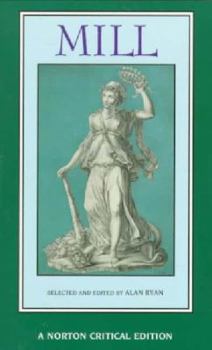Mill: The Spirit of the Age, on Liberty, the Subjection of Women
Select Format
Select Condition 
Book Overview
Alan Ryan's provocative introduction lays out the central issues debated by John Stuart Mill's many interpreters; in addition, it assesses Mill's historical significance and provides a brief account of his life. In recent years, scholars have increasingly focused on the connection between On Liberty and Mill's other writings. This Norton Critical Edition brings together three major essays that illustrate Mill's liberal political philosophy over the...
Format:Paperback
Language:English
ISBN:0393970094
ISBN13:9780393970098
Release Date:November 1996
Publisher:W. W. Norton & Company
Length:416 Pages
Weight:0.90 lbs.
Dimensions:0.8" x 5.2" x 8.4"
Customer Reviews
2 ratings
The great defender of individual liberty
Published by Thriftbooks.com User , 14 years ago
John Stuart Mill, 1806-73, worked for the East India Co. helped run Colonial India from England. Minister of Parliament 1865-68 he served one term. Maiden speech was a disaster his second was great success. He was first MP to propose that women should be given the vote on equal footing with the men who could vote. He got 1/3 support, England gives franchise to women after U.S. He was a great Feminist, his essay "Subjection of Women" is written with great passion and prose. It was a brave position for him to take he was ridiculed for it. He favored democracy, and letting more men from lower classes the right to vote, but believed that people that are more educated should have more votes then less educated because they would make better decisions about what government should do. He would have wanted to extend education to the masses, so that all may have gotten 2-3 votes and so on. He didn't think it should be extended to where a small elite could carry the day on votes. The idea was that if the working class, and middle class, where divided on an issue, the people with more intelligence would have the power to tip the balance. Mill thought that people with more education would probably not only be better able to make political decisions, especially in terms of intellectually being able to see what would be best for the government to do, but that they would also be more concerned about the common good publicly then people in general. He was intensely educated by his father James. John could read Greek, and Latin at 6 yrs.; his Dad tutored him at home. Dad thought environment was everything. He was treated like an adult, never played games with kids; he had a very cerebral upbringing. He had a period of depression in his twenties, it changed his philosophy, and he recognized the importance of developing feelings along with the intellect, this is something that he stressed in his work. He read poetry to get out of depression; he became devoted to poetry and became a romantic. He fell in love with a married woman Harriet Taylor, was a platonic relationship, after her husband's death they married 3 years later and probably never consummated the marriage maybe due to his having syphilis. His dedication to "On Liberty" is to her, very devoted to each other. Both buried together in Avignon France where they used to vacation. Mill as a moral theorist subscribed to a theory we call Utilitarianism. It means---In some way morality is about the maximization of happiness. Whether actions are right or wrong depends on how happiness can be most effectively maximized. I say in some way, because there are allot of different kinds of Utilitarians. Allot of different ways of saying exactly how it is the maximization of happiness comes into morality. Therefore, happiness is clearly an important idea for Utilitarians. Mill has a hedonistic view of happiness, he thinks that happiness can be defined in terms of "pleasure in the absence of pai
an excellent plunge into liberal thought
Published by Thriftbooks.com User , 22 years ago
John Stuart Mill sets the stage for all liberal political thought. He discusses such topics as the role of society over the individual, the role of the individual over society, the death penalty, the importance of the individual, the ideal voter, the ideal citizen, the role of women in society, and the importance of personal liberty. Alan Ryan superbly organizes this edition by also including some constructive criticisms of Mill's thought in the last partition. This book is an excellent edition for any student of political philosophy.




